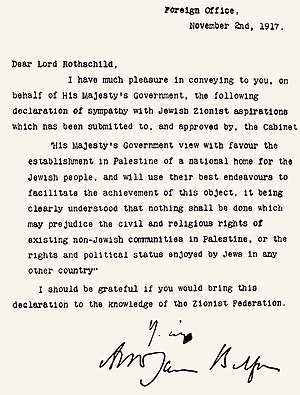 Global Information
Global InformationBalfour Declaration information
| Balfour Declaration | |
|---|---|
 The original letter from Balfour to Rothschild; the declaration reads:
| |
| Created | 2 November 1917 |
| Location | British Library |
| Author(s) | Walter Rothschild, Arthur Balfour, Leo Amery, Lord Milner |
| Signatories | Arthur James Balfour |
| Purpose | Confirming support from the British government for the establishment in Palestine of a "national home" for the Jewish people, with two conditions |
| Full text | |
The Balfour Declaration was a public statement issued by the British Government in 1917 during the First World War announcing its support for the establishment of a "national home for the Jewish people" in Palestine, then an Ottoman region with a small minority Jewish population. The declaration was contained in a letter dated 2 November 1917 from the United Kingdom's Foreign Secretary Arthur Balfour to Lord Rothschild, a leader of the British Jewish community, for transmission to the Zionist Federation of Great Britain and Ireland. The text of the declaration was published in the press on 9 November 1917.
Immediately following Britain's declaration of war on the Ottoman Empire in November 1914, it began to consider the future of Palestine. Within two months a memorandum was circulated to the War Cabinet by a Zionist member, Herbert Samuel, proposing the support of Zionist ambitions in order to enlist the support of Jews in the wider war. A committee was established in April 1915 by British Prime Minister H. H. Asquith to determine their policy towards the Ottoman Empire including Palestine. Asquith, who had favoured post-war reform of the Ottoman Empire, resigned in December 1916; his replacement David Lloyd George favoured partition of the Empire. The first negotiations between the British and the Zionists took place at a conference on 7 February 1917 that included Sir Mark Sykes and the Zionist leadership. Subsequent discussions led to Balfour's request, on 19 June, that Rothschild and Chaim Weizmann submit a draft of a public declaration. Further drafts were discussed by the British Cabinet during September and October, with input from Zionist and anti-Zionist Jews but with no representation from the local population in Palestine.
By late 1917, in the lead-up to the Balfour Declaration, the wider war had reached a stalemate, with two of Britain's allies not fully engaged: the United States had yet to suffer a casualty, and the Russians were in the midst of a revolution with Bolsheviks taking over the government. A stalemate in southern Palestine was broken by the Battle of Beersheba on 31 October 1917. The release of the final declaration was authorised on 31 October; the preceding Cabinet discussion had referenced perceived propaganda benefits amongst the worldwide Jewish community for the Allied war effort.
The opening words of the declaration represented the first public expression of support for Zionism by a major political power. The term "national home" had no precedent in international law, and was intentionally vague as to whether a Jewish state was contemplated. The intended boundaries of Palestine were not specified, and the British government later confirmed that the words "in Palestine" meant that the Jewish national home was not intended to cover all of Palestine. The second half of the declaration was added to satisfy opponents of the policy, who had claimed that it would otherwise prejudice the position of the local population of Palestine and encourage antisemitism worldwide by "stamping the Jews as strangers in their native lands". The declaration called for safeguarding the civil and religious rights for the Palestinian Arabs, who composed the vast majority of the local population, and also the rights and political status of the Jewish communities in other countries outside of Palestine. The British government acknowledged in 1939 that the local population's wishes and interests should have been taken into account, and recognised in 2017 that the declaration should have called for the protection of the Palestinian Arabs' political rights.
The declaration had many long-lasting consequences. It greatly increased popular support for Zionism within Jewish communities worldwide, and became a core component of the British Mandate for Palestine, the founding document of Mandatory Palestine. It indirectly led to the emergence of the State of Israel and is considered a principal cause of the ongoing Israeli–Palestinian conflict, often described as the world's most intractable conflict. Controversy remains over a number of areas, such as whether the declaration contradicted earlier promises the British made to the Sharif of Mecca in the McMahon–Hussein correspondence.